|
|
|
Sort Order |
|
|
|
Items / Page
|
|
|
|
|
|
|
| Srl | Item |
| 1 |
ID:
119191
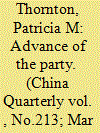

|
|
|
|
|
| Publication |
2013.
|
| Summary/Abstract |
While existing scholarship focuses attention on the impact of state control and repression on Chinese civil society, the increasingly independent role of the Communist Party has been largely overlooked. This article reviews the Party's drive to "comprehensively cover" grassroots society over the previous decade against the theoretical debate unfolding among Chinese scholars and Party theoreticians regarding the Party's role with respect to civil society. Focusing on greater Shanghai, frequently cited as a national model of Party-building, I describe the Party's advance and the emergence of Party-organized non-governmental organizations (PONGOs), a new hybrid form of social organization sponsored and supported by local Party committees. I argue that these developments invite a reconsideration of our understandings of the ongoing "associational revolution" and of the Party's relationship to China's flourishing "third realm."
|
|
|
|
|
|
|
|
|
|
|
|
|
|
|
|
| 2 |
ID:
189223
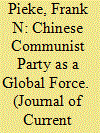

|
|
|
|
|
| Summary/Abstract |
The Chinese Communist Party (CCP) is currently in the throes of redefining itself as not just China's ruling party, but also as the dominant political force of global China. Following the path of Chinese globalisation, this project overlaps with – but is different from – China's much maligned strategy of influencing and interfering in the society and politics of other countries. The principal aim of the CCP's global extension is not to meddle in the affairs of other countries, but tying Chinese people, goods, money, business, and institutions that have ventured abroad back into the strategy and domestic system of China and the CCP. The article shows that China's emerging superpower is informed both by China's unique pattern of globalisation and the CCP's own understanding of the nature, aims, and modalities of its rule, which can only partially be compared to those of earlier superpowers.
|
|
|
|
|
|
|
|
|
|
|
|
|
|
|
|
| 3 |
ID:
173457
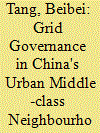

|
|
|
|
|
| Summary/Abstract |
This article examines the so-called “grid governance” scheme, a widely used grassroots governance strategy implemented in urban China in recent years. Drawing on data collected in multiple cities from 2011 to 2016, it analyses in what ways, and to what extent, the state employs the grid governance scheme to resolve neighbourhood conflicts and reinforce governance in Chinese urban middle-class neighbourhoods. The findings highlight complex interactions under the scheme among the residents, the state and market actors in neighbourhood governance, including the resident volunteers, residents’ social groups, residents’ committees and property management companies. By coopting middle-class resident volunteers, maximizing the existing political influence of the retired urban elites, and establishing Party organizations in middle-class residential communities, the grid governance scheme has become a major vehicle for resident mobilization and conflict resolution, and a key governance mechanism to reinforce the Party's leadership in middle-class neighbourhoods.
|
|
|
|
|
|
|
|
|
|
|
|
|
|
|
|
| 4 |
ID:
181933
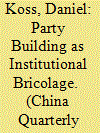

|
|
|
|
|
| Summary/Abstract |
The Chinese Communist Party (CCP) is expanding its organizational infrastructure in the private sector, revealing the dynamics of CCP-style institutional change. Party building follows a distinct version of adaptive governance. Hesitant to rely on innovative tools alone, organizers productively tinker with traditional and disparate elements. Grassroots Party organs, sanctified by their venerable history, are redeployed – initially for modest purposes that fall short of their original revolutionary potential. The Party's surge in private-sector firms was triggered by technocrats overhauling Leninist systems to reconnect to Party members; the search for a broader mission came later. To empower CCP organs in companies, organizers use tactical precedents ranging from incentives to negotiations around Party financing, and membership discipline. Combining tactics from different eras, overseas Party building deploys old organizational arrangements to new ends, whereas digitization gives time-worn procedures a second life. The inclination for institutional bricolage is a deeply rooted hallmark of innovation in Chinese statecraft.
|
|
|
|
|
|
|
|
|
|
|
|
|
|
|
|
| 5 |
ID:
181934
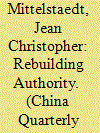

|
|
|
|
|
| Summary/Abstract |
While existing scholarship looks at the relationship between the Chinese Communist Party (CCP) and emerging social strata and civil society, the Party's impact on its own grassroots has been largely overlooked. How does the Party manage its own grassroots members? I argue that the CCP has ritualized its management practices in recent years. Drawing from a dataset of 1,408 “Thematic Party Days” (TPDs) conducted by grassroots Party branches in Beijing, I show how such practices are geared towards integrating ordinary Party members with the Party centre in Beijing and the Party in general. This reflects a major shift in the Party's organizational strategy, moving away from embracing market values and towards reproducing the Party's values and ideology at the grassroots.
|
|
|
|
|
|
|
|
|
|
|
|
|
|
|
|
| 6 |
ID:
151406
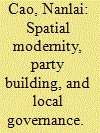

|
|
|
|
|
| Summary/Abstract |
While Christianity is among the fastest growing religions in the reform
era, state-led sporadic demolition campaigns have targeted unauthorized
church structures and sites in order to contain massive Christian
growth, especially in regions where there is a high concentration of
Christian population. Such campaigns oft en stir heated international
concerns about China’s religious freedom violations, naturally making
church-state relations the recurring central theme of both public and
academic discourses on the church in China. However, a heightened
emphasis on church-state tensions and religious persecution may
obscure the cultural and spatial dimensions of local church development.
Focusing on the case of the recent campaign against rooft op
crosses in Wenzhou—the most Christianized Chinese city, I go beyond
the one-dimensional framework of church-state relations by off ering a multifaceted analysis of the local religious scene in the political
economic contexts of contested spatial modernity and of central-local
relations amid the party-building process. In so doing, I methodologically
place Chinese Christian studies at the center of contemporary
China studies.
|
|
|
|
|
|
|
|
|
|
|
|
|
|
|
|
| 7 |
ID:
184087
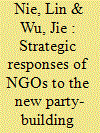

|
|
|
|
|
| Summary/Abstract |
Over the last decade, the Chinese Communist Party (CCP) has sought to assimilate the third sector – non-governmental organizations (NGOs) – through its party-building campaign. This article examines NGOs’ strategies in response to this campaign, based on in-depth interviews with 64 NGOs and local cadres. We find that NGOs have developed three main strategies to respond to the CCP’s attempts to penetrate their organizations. First, NGOs embedded in the party-state system and those affiliated with private enterprises tend to acquiesce to party building out of habit and for compliance reasons, respectively. Second, those with multiple stakeholders generally compromise in the party-building process, acting as passive compliers if they depend more on non-state resources, or active players if they rely more on state resources. Third, civic NGOs that advocate causes inconsistent with the ruling regime might avoid party building as a resistant strategy, by either disguising their nonconformity or escaping from the control of the ruling regime entirely. NGOs’ strategic responses are contingent on their negotiating power, which results from their resource dependence and the party’s enforcement dilemmas. This article contributes to our understanding of the recent party-building campaign from an institutional perspective, and enriches our knowledge about relations between the party and the third sector.
|
|
|
|
|
|
|
|
|
|
|
|
|
|
|
|
|
|
|
|
|